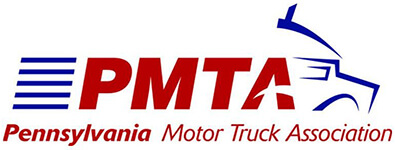Near Zero Emission Truck Incentive Program Bill reintroduced with bipartisan support
Senator Brown has reintroduced the Near Zero Emission Truck Incentive Program legislation as Senate Bill 147. PMTA worked closely with Senator Brown on this important and bipartisan transportation legislation.
Senator Rosemary Brown (R-40) reintroduced the Near Zero Emission Truck Incentive Program legislation as Senate Bill 147.
This legislation creates the Near Zero Emission Truck Incentive Program, a grant program administered by the Department of Transportation (PennDOT), in consultation with the Department of Environmental Protection (DEP), to reduce air pollution from heavy duty diesel vehicles in Pennsylvania.
The federal government took steps to tightly regulate heavy duty truck emissions between the model years 2007 and 2010 by requiring the standardization of selective catalytic reduction and diesel particulate filters (40 CFR § 86.007-11 (Emission standards and supplemental requirements for 2007 and later model year diesel heavy-duty engines and vehicles) https://www.ecfr.gov/current/title-40/chapter-I/subchapter-C/part-86/subpart-A/section-86.007-11) As a result, a truck that was sold in 2006 emits roughly 10 times the amount of NOx and particulate matter as a truck sold today.
Due to various market-driven factors, 34% of trucks registered in Pennsylvania are pre-2010 model trucks, which do not contain the latest emissions components. These trucks contribute most of the emissions from the trucking industry in the state. The proposed grant program will lead to the replacement of these trucks with newer, much cleaner trucks, resulting in lower emissions from the trucking industry and cleaner air for all. Moreover, the National Highway Traffic Safety Administration research is clear that the older the truck, the higher the accident fatality rate. The addition of multiple standard safety technologies by original equipment manufacturers in post-2010 will directly save lives in Pennsylvania.
Specifically, it will require PennDOT and DEP to apply for federal funds available for the purpose of reducing pollution. With these funds, PennDOT will provide a grant to incentivize the purchase of model year 2010 or later trucks to be titled and registered in Pennsylvania, if accompanied by a trade-in of a pre-2010 diesel truck that is also titled and registered in Pennsylvania but shall be prohibited from being titled or registered again in this state.
Pennsylvania’s location, demographics, and mix of industries make it the perfect state for this legislation to be successful. The American Lung Association’s 2023 Delivering Healthy Air report identifies nearly $50 billion in associated health costs for the Commonwealth resulting from freight transportation between 2020 and 2050. We cannot afford to wait for solutions decades down the road when the technology exists today to make impactful changes. In the Governor’s recent budget address, he correctly pointed out that one in three Pennsylvanians will be over 60 in 2030, and they are the most susceptible group to air pollution.
At the same time, one in every 15 jobs in the state is in the trucking industry, with almost 70,000 trucking companies in Pennsylvania. Most are small, locally owned businesses, with 96% having ten or fewer trucks. Many of these small businesses, which are more likely to be women- and minority-owned, likely will never be in the market for a new diesel truck, much less a new electric, truck, costing as much as two to three times what a new clean diesel truck does. Therefore, public policy should focus on the small businesses in the freight transportation sector that can benefit the most from upgrading to newer trucks, which are not only cleaner, but are also safer and more efficient.
Near zero emission clean diesel is an excellent technology. Whether it’s a Mack - built right here in Pennsylvania - or another American-manufactured truck, 2024 models are more than 60 times cleaner than a 1988 model. That means a fleet of more than 60 new clean diesel trucks today operates with the same emissions as a single truck 30 years ago. Because well-maintained clean diesel trucks can operate for multiple decades, the environmental and public health benefits will continue beyond the year the grants are awarded. Near zero emission diesel trucks can also utilize cleaner biodiesel and renewable diesel without any modification, paving the way for further benefit as these fuels become more readily available and affordable.
No other single technology transfer can affect Pennsylvania’s air quality and provide immediate health benefits as much as replacing pre-2010 trucks with post 2010 models.
The bill must now be considered by the Senate Transportation Committee.
